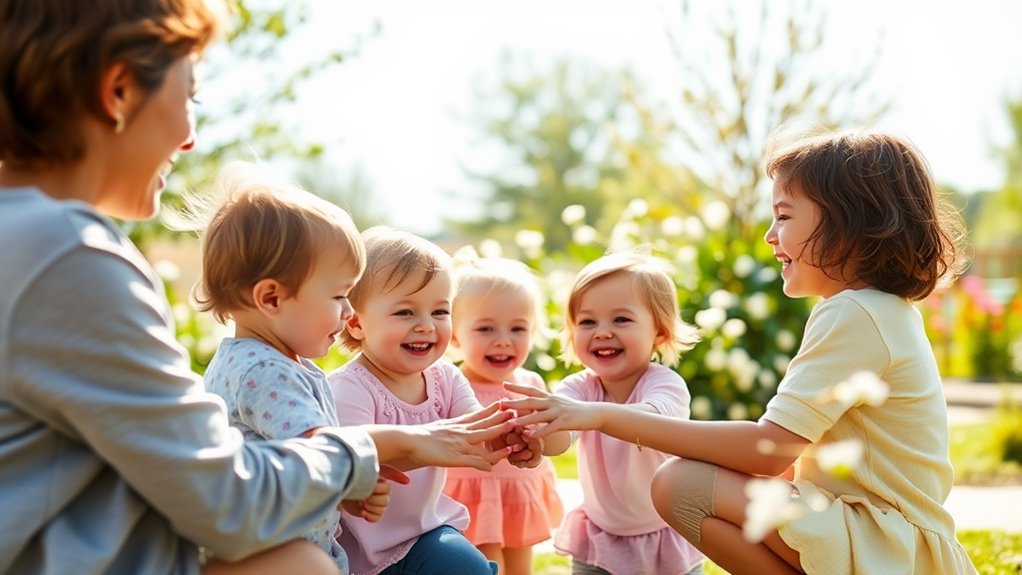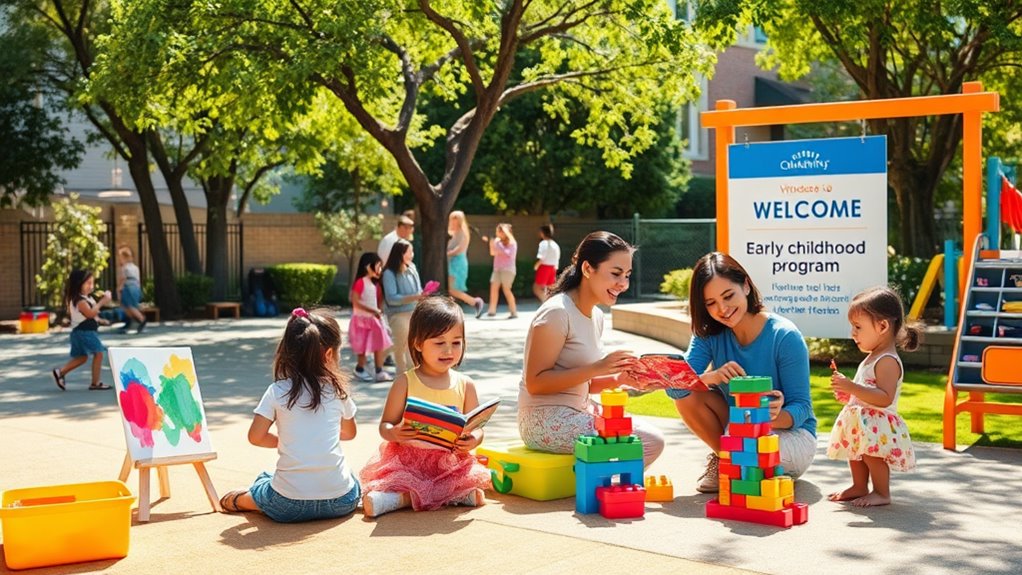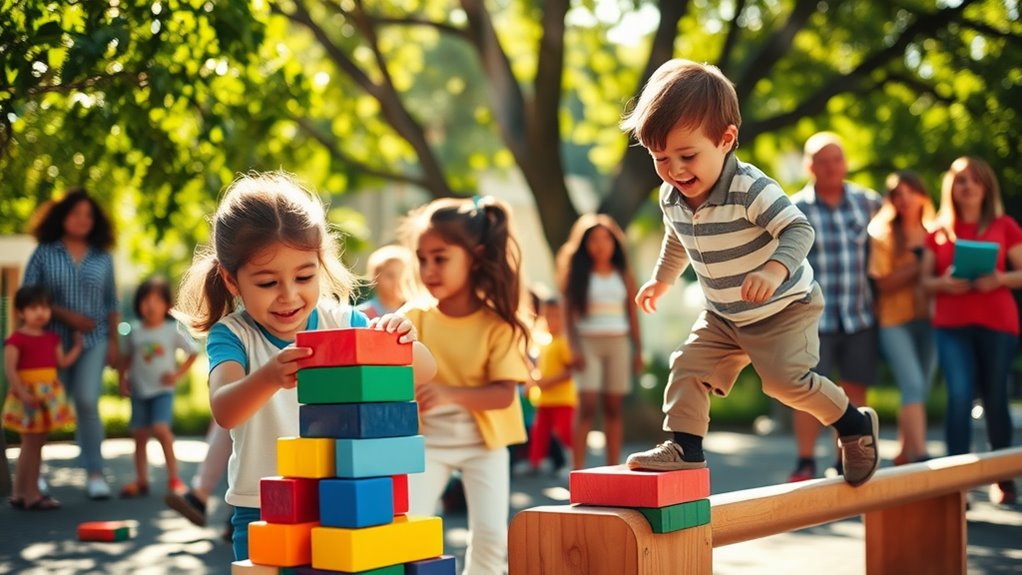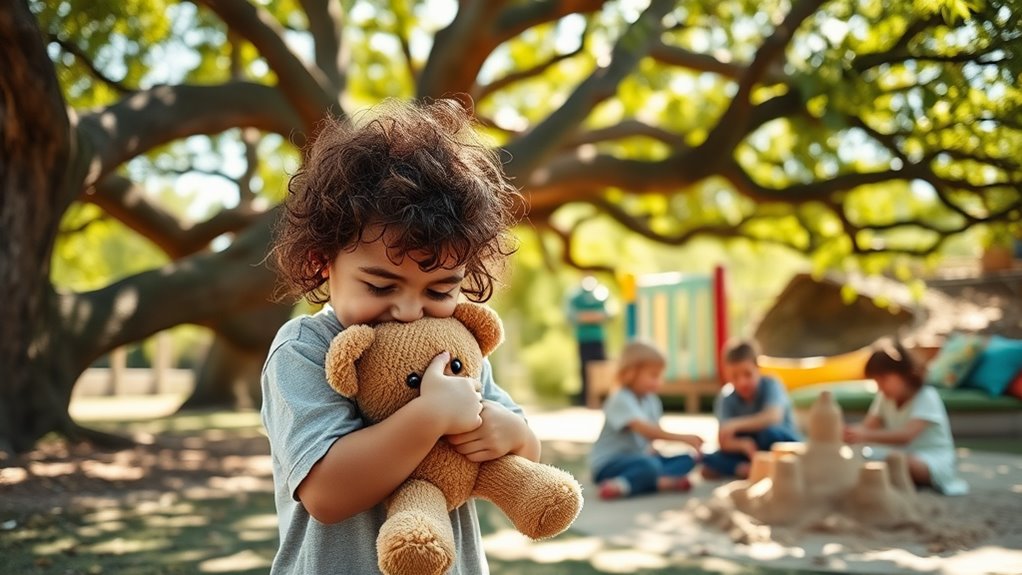Why Emotional Development in Early Childhood Matters More Than You Think!
Emotional development in early childhood is more important than you might think. It lays the groundwork for understanding and managing feelings, which influences how well you navigate social situations. When kids recognize and express emotions, they build empathy and can form strong relationships. This strong emotional foundation also connects to mental health and resilience, helping them cope with challenges later in life. Moreover, emotional skills are linked to academic success and teamwork, making them essential for lifelong achievement. There’s much more to explore about how these early years shape a child’s future and well-being.
Key Takeaways
- Early emotional development fosters lifelong relationships by helping children recognize and express their feelings effectively.
- Empathy and emotional awareness enhance social skills, enabling children to navigate complex interactions and build strong peer connections.
- A solid emotional foundation contributes to mental health, equipping children with resilience and coping strategies for future challenges.
- Strong emotional skills correlate with academic success and teamwork, influencing overall achievement throughout life.
- Supportive environments and nurturing interactions promote emotional growth, ensuring children feel safe to explore and express their emotions.
Understanding Emotional Development
Emotional development in early childhood plays a crucial role in shaping how kids understand themselves and relate to others. As a parent or caregiver, you’ll notice your child hitting various emotional milestones, like recognizing their feelings and expressing empathy toward others. These milestones are essential for building a solid emotional foundation, which influences their relationships throughout life.
Your influence as a caregiver can’t be overstated. When you respond to your child’s emotions with understanding and validation, you help them navigate their feelings more effectively. For instance, if they’re upset and you acknowledge their feelings, it teaches them that it’s okay to express emotions and seek support. This interaction fosters a safe environment where they can explore and understand their emotions without fear of judgment.
Additionally, modeling emotional regulation is key. When you handle your own emotions in healthy ways, your child learns by example. They’ll observe how you react in different situations and start to mimic those behaviors. This process is crucial in helping them develop their emotional intelligence, which will serve them well as they grow and interact with the world around them.
Impact on Social Skills
Understanding and managing emotions directly influences a child’s social skills. When kids can recognize their feelings and those of others, they’re better equipped to navigate complex social situations. This emotional awareness forms the foundation for empathy building, which is crucial for developing strong peer relationships.
By learning to empathize, children can respond appropriately to their friends’ needs, which fosters cooperation and mutual respect. As they engage in play and group activities, kids who understand emotions are more likely to share, take turns, and resolve conflicts peacefully. These skills not only enhance their interactions but also create a positive environment where friendships can blossom.
When children can articulate their feelings and listen to others, they cultivate deeper connections with their peers. Moreover, strong emotional skills help kids feel more confident in social settings. They’re less likely to withdraw or act out, which can lead to exclusion. Instead, they become active participants, learning to communicate effectively and build lasting relationships.
Ultimately, investing in emotional development during early childhood sets the stage for healthy social skills that will benefit your child throughout their life.
Connection to Mental Health
A strong connection exists between emotional development in early childhood and mental health. When you nurture a child’s ability to express and manage their emotions, you’re laying a foundation for their mental wellness.
Kids who develop emotional resilience early on are better equipped to handle life’s challenges, whether it’s a minor setback or a significant stressor.
By encouraging children to identify their feelings and respond to them constructively, you help them build coping strategies that can last a lifetime. This early emotional intelligence can act as a buffer against anxiety and depression later on.
Moreover, children who feel secure in their emotions are more likely to form healthy relationships, which further supports their mental health. They learn that it’s okay to seek help and communicate their needs, fostering a supportive network around them.
In essence, the emotional skills kids develop in their formative years can significantly impact their mental health as they grow older. By prioritizing emotional development, you’re not just enhancing their current happiness; you’re equipping them for a healthier future.
Influence on Lifelong Success
Research shows that children who develop strong emotional skills are more likely to achieve lifelong success. When you nurture emotional intelligence in your child, you’re equipping them with essential tools for navigating life’s challenges.
Emotional intelligence enables kids to understand and manage their own emotions, as well as empathize with others. This understanding fosters strong interpersonal relationships, a key factor in both personal and professional success.
Self-regulation skills, a critical component of emotional intelligence, allow children to control their impulses and emotions effectively. When kids learn to calm themselves in stressful situations, they’re better prepared to tackle challenges head-on.
These skills contribute to resilience, enabling them to bounce back from setbacks and maintain focus on their goals.
Moreover, children with strong emotional skills often perform better academically. They can concentrate on their studies and collaborate with classmates, cultivating teamwork and communication abilities that are invaluable later in life.
As you support your child’s emotional development, remember that these skills won’t just help them through school; they’ll lay the groundwork for a fulfilling and successful future in all areas of life.
Strategies for Supporting Growth
Nurturing your child’s emotional development doesn’t have to be overwhelming. One of the best ways to support this growth is through playful interactions. Engage in activities that allow your child to express their feelings, like role-playing or storytelling. These fun moments not only create lasting memories but also help your child learn to recognize and manage their emotions.
Creating nurturing environments is equally important. Ensure your home is a safe space where your child feels comfortable sharing their thoughts and feelings. Encourage open communication and validate their emotions, letting them know it’s okay to feel sad, happy, or frustrated. This builds emotional resilience and confidence.
Additionally, model healthy emotional behaviors. Show your child how to cope with stress or disappointment by discussing your feelings and strategies. When they see you navigating emotions positively, they’ll learn to do the same.
Lastly, don’t forget the power of routine. Establishing consistent daily practices can provide a sense of security, helping your child understand and manage their emotions better.
Frequently Asked Questions
How Can Parents Recognize Signs of Emotional Development in Their Child?
To recognize signs of emotional development, you should pay attention to your child’s emotional awareness. Parent observations like their reactions to feelings, ability to share emotions, and social interactions can provide valuable insights into their growth.
What Role Do Siblings Play in Emotional Development During Early Childhood?
Siblings influence emotional development by providing both emotional support and opportunities for navigating sibling rivalry. They help you learn conflict resolution, empathy, and sharing, all vital skills that shape your child’s emotional intelligence and resilience.
Can Emotional Development Affect Academic Performance in Later Years?
Absolutely! If you think emotional intelligence doesn’t impact learning outcomes, you’re wildly mistaken. It shapes your ability to navigate challenges, collaborate effectively, and enhances critical thinking, ultimately elevating academic performance in ways you can’t even imagine!
How Does Culture Influence Emotional Development in Young Children?
Culture shapes how you view emotional expression and what’s deemed acceptable. Different cultural norms influence how young children learn to express their feelings, impacting their emotional development and interactions with others throughout their lives.
What Are Common Misconceptions About Emotional Development in Early Childhood?
Some think emotional development’s just a phase, but it’s crucial. Misconceptions include believing emotional regulation’s solely innate or that parenting styles don’t impact it. In reality, nurturing environments shape children’s emotional futures dramatically.





